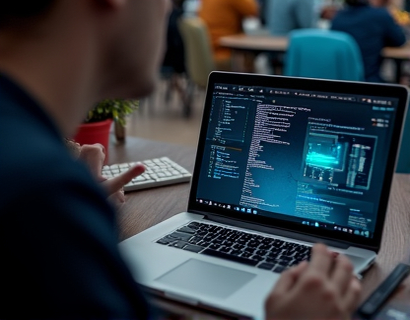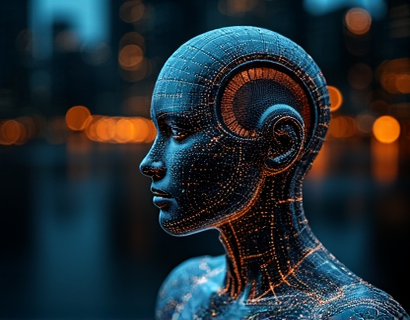Revolutionizing the Digital Ecosystem: The Synergy of AI and Crypto
The integration of artificial intelligence (AI) and cryptocurrency is ushering in a new era of digital transformation, fundamentally altering the way we interact with technology and each other. This convergence is not just a technological advancement but a paradigm shift that is redefining the digital landscape. By leveraging the strengths of both AI and cryptocurrency, innovative solutions are emerging that enhance user experiences, drive growth, and foster deeper connectivity within the tech ecosystem.
The Intersection of AI and Cryptocurrency
At the core of this revolution is the intersection of AI and cryptocurrency. AI brings intelligence, automation, and predictive capabilities to the table, while cryptocurrency offers a decentralized, secure, and transparent medium for transactions. When combined, these technologies create a powerful synergy that can transform various sectors, from finance and healthcare to entertainment and beyond.
The use of AI in the cryptocurrency space is multifaceted. AI algorithms can analyze vast amounts of market data to predict price movements, optimize trading strategies, and manage risk more effectively. Smart contracts, a cornerstone of blockchain technology, can be enhanced with AI to automate complex transactions and ensure compliance with predefined rules. This not only increases efficiency but also reduces the potential for human error and fraud.
Enhancing User Experiences through AI-Driven Crypto Solutions
One of the most significant impacts of this synergy is the enhancement of user experiences in crypto applications. Traditional crypto platforms often suffer from complex interfaces, slow transaction times, and a steep learning curve. AI-driven solutions are addressing these issues head-on, making crypto more accessible and user-friendly.
For instance, AI-powered chatbots and virtual assistants are becoming common in crypto apps, providing users with real-time support and guidance. These AI assistants can answer queries, explain complex concepts, and even assist with transactions, all in a conversational and intuitive manner. This not only improves user satisfaction but also lowers the barrier to entry for new users.
Moreover, AI-driven analytics tools are helping users make more informed decisions. By analyzing historical data and current market trends, these tools provide insights that can guide investment strategies. Users can gain a competitive edge by leveraging AI-generated recommendations, which are based on sophisticated algorithms and machine learning models.
Decentralized Finance (DeFi) and AI
The DeFi space is one of the most exciting areas where AI and cryptocurrency are converging. DeFi platforms aim to create a financial system that is open, transparent, and accessible to everyone, without the need for intermediaries. AI enhances this vision by introducing advanced features such as automated portfolio management, risk assessment, and fraud detection.
AI algorithms can dynamically adjust investment portfolios based on real-time market conditions, ensuring optimal returns while minimizing risk. This level of automation is particularly valuable in the volatile crypto market, where timing and decision-making are crucial. Additionally, AI-powered oracles can provide accurate and timely data to smart contracts, enabling more sophisticated and reliable DeFi applications.
Fraud detection is another critical area where AI shines. DeFi platforms are not immune to scams and malicious activities. AI-driven systems can monitor transactions and user behavior to identify and flag suspicious activities, enhancing the overall security of the ecosystem. This not only protects users but also builds trust in DeFi platforms.
Crypto and AI in Healthcare
The healthcare sector is another domain where the combination of AI and cryptocurrency is making a significant impact. AI-driven solutions can analyze medical data to identify patterns, predict disease outbreaks, and personalize treatment plans. Cryptocurrency, particularly through the use of blockchain, ensures the secure and privacy-preserving storage and sharing of medical records.
For example, AI algorithms can process large datasets from wearable devices and electronic health records to detect early signs of diseases such as diabetes or heart disease. This proactive approach to healthcare can lead to better outcomes and reduced healthcare costs. Blockchain technology, powered by cryptocurrency, ensures that patient data is tamper-proof and accessible only to authorized parties, maintaining privacy and compliance with regulations like GDPR.
Moreover, cryptocurrency can facilitate micropayments for healthcare services, making high-quality care more accessible to a broader population. AI-driven platforms can manage these transactions efficiently, ensuring that providers are compensated fairly while patients pay only for the services they use.
Entertainment and Media: A New Frontier
The entertainment and media industries are also experiencing a digital transformation driven by AI and cryptocurrency. AI algorithms can analyze viewer preferences and behavior to curate personalized content recommendations, enhancing the user experience on streaming platforms. This level of personalization not only increases user engagement but also helps content creators and distributors understand their audience better.
Cryptocurrency plays a crucial role in this ecosystem by enabling new monetization models. Creators can tokenize their content, allowing fans to purchase and own unique digital assets such as exclusive videos, behind-the-scenes material, or even virtual merchandise. Smart contracts can automate royalty payments, ensuring that creators are fairly compensated for their work.
AI-driven virtual influencers and avatars are another emerging trend. These digital entities can interact with fans, participate in events, and even generate revenue through sponsorships and merchandise sales. The use of cryptocurrency ensures that transactions are secure and transparent, fostering a trustworthy environment for both creators and consumers.
Challenges and Considerations
Despite the numerous benefits, the integration of AI and cryptocurrency is not without challenges. Regulatory uncertainty remains a significant hurdle, as governments worldwide are still grappling with how to oversee these decentralized and often borderless technologies. Compliance with existing financial regulations and the development of new frameworks are essential to ensure the sustainable growth of this ecosystem.
Another challenge is the technical complexity involved in building and maintaining AI-driven crypto applications. Developers need a deep understanding of both AI and blockchain technologies to create robust and secure solutions. This requires a skilled workforce and continuous investment in research and development.
Moreover, the environmental impact of cryptocurrency, particularly proof-of-work blockchains, is a concern that cannot be ignored. The energy consumption associated with mining operations is substantial, and the integration of AI adds to this footprint. Exploring more sustainable consensus mechanisms and renewable energy sources is crucial to mitigate this impact.
Future Prospects
Looking ahead, the synergy between AI and cryptocurrency is poised to drive even more innovative solutions and use cases. The development of AI-enhanced decentralized autonomous organizations (DAOs) could redefine governance and decision-making processes in various industries. These DAOs can leverage AI to optimize resource allocation, predict market trends, and ensure transparent and democratic operations.
The rise of Web 3.0, a decentralized internet powered by blockchain and AI, promises a more secure, private, and user-centric web experience. In this future, users will have greater control over their data and digital identities, with AI-driven tools enhancing privacy and security measures.
Furthermore, the integration of AI and cryptocurrency can revolutionize supply chain management, smart cities, and even governance. AI can optimize logistics and resource distribution, while cryptocurrency can facilitate seamless and transparent transactions. The potential applications are vast, and the future looks incredibly promising.
In conclusion, the convergence of AI and cryptocurrency is not just a technological trend but a transformative force that is reshaping the digital ecosystem. By enhancing user experiences, driving innovation, and fostering connectivity, this synergy is paving the way for a more intelligent, secure, and inclusive future. As the tech community continues to explore and develop these technologies, the possibilities are endless, and the impact will be profound.










































